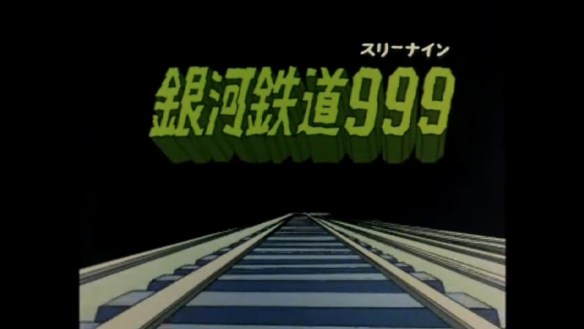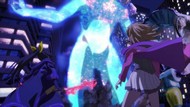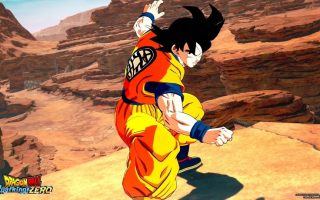Hello folks, and welcome back to Wrong Every Time. Today I am pleased as punch to announce that we’re shipping out aboard the Galaxy Express, joining Tetsuro and Maetel in their continued explorations of the sprawling and mysterious universe. What we may find is anyone’s guess, though we can be assured our investigations will uncover both fanciful scifi invention and sobering moral commentary, reminding us that the cruelty of society and tragedy of human ambition are constants wherever the tracks may take us.
Our last episode directly challenged Tetsuro’s pursuit of a metallic body, as he encountered creatures living formless lives with no stable bodies of their own. Their yearning for Tetsuro’s stability recalled to mind Shadow’s desperate coveting of her own abandoned form, raising a question of whether a new body can truly make us happy, or if we are simply doomed to feel forever insufficient with the form we are granted. And even if we do treasure our bodies, we must contend with the reality that nothing organic lasts – or refuse to, as the suicidal lovers of the episode’s end chose. Is it better to accept mortality or flaunt it through proud self-destruction – these and other classic children’s cartoon questions as we return to Galaxy Express 999!
Episode 12
And there that whistle blows. This OP has swiftly reached that Anne of Green Gables level of immediately improving my mood, the train inviting me to ride along with Tetsuro just as Anne’s horse-drawn carriage carries me home. I adore both productions, and am immensely grateful I get to write about them for you folks
“The Fossilized Warrior – Part One”
Our title card is complimented by a pair of marble busts. Obviously the idea of fossilized bodies or forms frozen in statuary has a particular resonance for Galaxy Express 999, which contends that the price of immortality is sacrificing everything that makes life worth living. You can exist forever, but you will be forever apart from the vitality of existence
Some nice exaggerated expressions and character acting as Tetsuro awkwardly heads to the bathroom
The train hits debris on the track! Tetsuro is thrown straight out the goddamn window!
I am persistently charmed by the flagrant unreality of space travel in this world. It’s genuinely an inspiration; our frustratingly literally-minded modern narrative sensibilities would have us questioning why a coal-powered train can travel through space, but Matsumoto understands his work’s intellectual weight comes through in its philosophical inquiry, not its scientific accuracy. Thus we can have Tetsuro lose his footing and crash through a window right out onto another planet, because such a sequence is dynamic and in keeping with the universe he has created. I should commit myself to more often responding “who the fuck cares” when I find myself asking a question about logically justifying some flavorful worldbuilding embellishment
Of course, that’s not to say there isn’t value in fictional worlds being internally coherent. But what particular internal coherency a given narrative should strive for is ultimately dependent on the goals of that narrative, not the rules of our own reality
Some pleasantly bouncy animation in general this episode – there’s a nice elasticity to Tetsuro bonking his head on a rock, and in the subsequent cut of the conductor nearly running into Maetel
The conductor explains someone blocked the tracks with rocks, while Tetsuro finds himself resting in a graveyard of discarded statuary. Just one evocative image after another with this show
Maetel offers the ominous reveal that these statues were not carved, but formed naturally
“I don’t know who blocked the tracks. But if they come out, there may be some killings.” The desperation and violence provoked by such isolated planets and oppressive economic structures isn’t theoretical in Galaxy Express 999; death is a persistent possibility, with those whose blood greases the wheels of the Express frequently reaching up to extract their own toll. The show’s brutality helps bolster Tetsuro’s fundamental argument; if a mortal life is this cheap and easily lost, how could trading it for eternity be a bad deal? Would it truly be better to die like his mother, a senseless victim of power structures beyond his understanding?
“I wonder what kind of person blocked the train.” Though his quest is misguided, Tetsuro possesses the most essential qualities for personal growth: a willingness to admit what he does not understand, and an earnest curiosity regarding the unknown. Our world would be a much better place if more people possessed humility and curiosity; sadly, opposition to those qualities is more or less the foundation of conservatism
Maetel reveals we are “over 30,000 light years” from Tetsuro’s galaxy
Such a strange, lonely thought; endless eons from our own homeworld rests a planet populated by dead faces, eternal signifiers of a people whose lives and stories are forever unknown to us. Another melancholy form of immortality
As ever, the conductor’s presence only makes the Galaxy Express feel all the more lonely, emphasizing the total lack of other passengers. The train is like life itself; you will briefly share the rail with other travelers, and might even make a commitment to traveling together with a trusted companion, but most acquaintances will only last briefly and then swiftly fade into memory
“Only the curious one will grow up to be a great individual.” Of course, Tetsuro in particular can take his curiosity in some troublingly life-threatening directions
One of the statues appears unbroken, a perfect form of a beautiful woman. It’s fundamentally unnerving stuff, calling into question whether the human form is some sort of universal constant, and also recalling the sad ice graveyard of Pluto
In the context of these alienating statues, Tetsuro’s discovery of a real human skull feels oddly comforting, a reminder that mortal, flesh-and-blood humans have also walked these plains. That in turn emphasizes the correlation between these statues and Tetsuro’s desired metal body, if even a skull imparts a greater sense of warmth and camaraderie than a perfect yet artificial form
And at last, the man stalking these hills reveals himself, declaring Tetsuro a fossil thief
Oh wow, phenomenal composition as we cut to this fossil-defender’s back. From Tetsuro’s position at the top left, the lines of this warrior’s shadow and sword draw the eye downward and rightward, partitioning the frame into something approaching comic panels while also drawing the eye down and along the man’s blade, which gleams right where it crosses the gap between the skeleton and his severed head. Fundamentally compelling visual geometry that also tells a story, presenting this situation as an undeniable dual to the death
But Tetsuro forgot his gun! The warrior slashes him in the back as he flees
The warrior discovers Tetsuro’s 999 pass. Confronted by Maetel, he says he needs it to “return Leija back to normal”
Classic gunslinger faceoff composition as the two converse. Galaxy Express is always a little western-influenced, but some episodes bear that influence more blatantly than others
Maetel employs a flashbang to defeat him in combat. Interesting how basically all of her combat techniques are defensive measures, more focused on facilitating escape than victory
“It’s just like sewing in the 20th century.” Maetel laughs as she stitches Tetsuro’s grievous wound, demonstrating her somewhat off-kilter moral sensibilities
The conductor demands Tetsuro get off the train, since he now lacks a pass. “Policy is policy” – there is neither malice nor sympathy in the conductor’s stance, simply the comfortable passivity of one who has accepted their role within a dehumanizing system
“Policy, policy, policy! That’s all you talk about!” Tetsuro becomes swiftly acquainted with capitalism’s variation on the Nuremberg Defense
“It’s the policy. Please don’t hate me.” It’s a handy trick – by offloading the inhumanity capitalism demands onto the company itself, we can pretend the company is the one responsible for our personal sins. In truth, every day in which we accept that allowing wealth to be so concentrated is just, we lose just the tiniest further fragment of our souls
Maetel chooses to leave the train as well. A key moment, demonstrating greater loyalty to Tetsuro than to the company
They return to the frozen statue of a woman. Feeling shades of The Enigma of Amigara Fault in this story, with its lost souls consumed by the stones
They discover a massive crashed ship among the red sands abutting the statue hills. Real effective economy of detailing with these planets; Matsumoto offers them each just as much definition as they require to feel worth exploring
Sneaking inside, they discover it is still powered. Presumably the machines here are maintaining the warrior’s lost Leija
Another neat composition making use of that shimmering blade edge as Tetsuro and Maetel enter his darkened chamber. The total blackness of this chamber emphasizes its status as the end of the line; only the warrior remains before them
The warrior states this planet was once beautiful and full of life, a sanctuary shared by him and his companions
He left the planet to investigate an approaching cloud, learning too late that this cloud would fossilize the planet. The universe is brimming with terrible, senseless dangers
Ooh, quite an impressive cut of the ship crash landing back on the surface, with dust and wind whipping all around
Thus he became the statues’ protector, defending these markers of his absent friends from thieves who would sell them on the black market. Even this tragedy can be turned into profit
“That person… she looks just like that fossilized woman.” Matsumoto has many talents, but drawing distinctions between the particular features of attractive women is not one of them
But then, fossil thieves descend!
Interesting, menacing designs for these thieves – they’re conveyed all in deep shades of blue, with ominous black eyes
The warrior fights them back initially, but is then captured by a fiendish trap. And what’s worse, a fossilizing gas cloud is approaching the planet once more!
And Done
Thus Tetsuro’s perilous journey continues, with each new planet offering its own eerie wonders and personal tragedies. The tale of the fossil warrior and his lady love clearly resonates with Galaxy Express 999’s general concerns, offering a man who is so emotionally bound he cannot imagine departing this planet, and a woman whose brush with eternity cost her the entirety of her conscious self. Where do we choose to wager our life, and what bond is so precious that we’d cast aside a lifetime of possibility to venerate it? Whether existing forever is a choice or an assigned sentence, the horror of stagnancy awaits all who abandon forward motion, who center their life on one moment, dream, or self-image. The unknown horizon is frightening, but the steady decay of inertia is even more terrible.
This article was made possible by reader support. Thank you all for all that you do.




